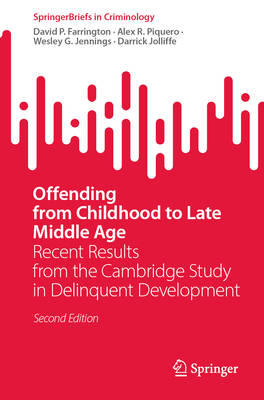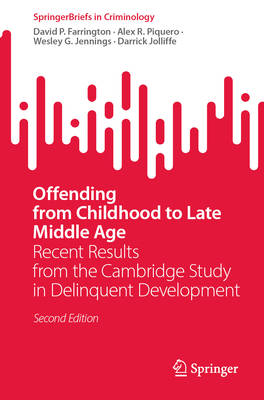
- Retrait gratuit dans votre magasin Club
- 7.000.000 titres dans notre catalogue
- Payer en toute sécurité
- Toujours un magasin près de chez vous
- Retrait gratuit dans votre magasin Club
- 7.000.0000 titres dans notre catalogue
- Payer en toute sécurité
- Toujours un magasin près de chez vous
Offending from Childhood to Late Middle Age
Recent Results from the Cambridge Study in Delinquent Development
David P Farrington, Alex R Piquero, Wesley G Jennings, Darrick JolliffeDescription
This second edition book advances knowledge about criminal careers throughout life. It presents new results from the Cambridge Study in Delinquent Development (CSDD), which is a unique longitudinal study of the development of offending from age 10 to age 61. Previous results obtained in the CSDD are reviewed, and then new findings from official criminal records up to age 61 are presented: on offending at different ages, continuity in offending, ages of onset, and criminal career duration. The number of offenders and offenses between ages 50 and 61 is noteworthy. The book then presents results on self-reported offending in different age ranges up to 48: on prevalence, frequency, continuity, and comparisons with official records that suggest that official records only capture the tip of the iceberg of offending. It then analyzes different trajectories of official offending up to age 61 and shows to what extent they could be predicted by childhood risk factors. New results from the CSDD in the last 10 years are then presented, followed by a discussion of the relevance of all the findings for criminological theories and public policies such as early intervention. This book should be of great interest not only to academics but also to policy makers and practitioners who are concerned with crime.
.
.
.
.
.
.
.
.
.
.
.
.
.
.
.
.
Spécifications
Parties prenantes
- Auteur(s) :
- Editeur:
Contenu
- Nombre de pages :
- 98
- Langue:
- Anglais
- Collection :
Caractéristiques
- EAN:
- 9781071633342
- Date de parution :
- 31-05-23
- Format:
- Livre broché
- Format numérique:
- Trade paperback (VS)
- Dimensions :
- 156 mm x 234 mm
- Poids :
- 172 g

Les avis
Nous publions uniquement les avis qui respectent les conditions requises. Consultez nos conditions pour les avis.






